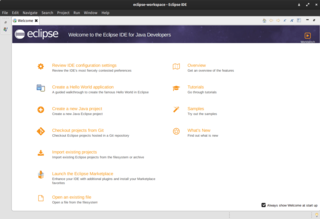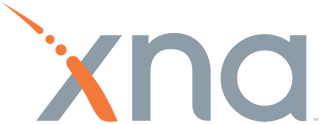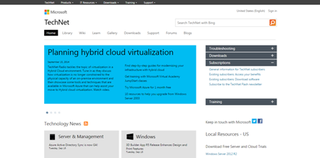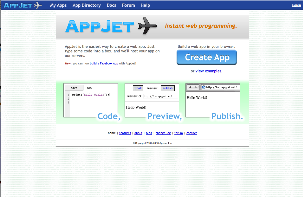
SourceForge is a web-based service that offers software developers a centralized online location to control and manage free and open-source software projects. It provides a source code repository, bug tracking, mirroring of downloads for load balancing, a wiki for documentation, developer and user mailing lists, user-support forums, user-written reviews and ratings, a news bulletin, micro-blog for publishing project updates, and other features.

Eclipse is an integrated development environment (IDE) used in computer programming. It contains a base workspace and an extensible plug-in system for customizing the environment. Eclipse is written mostly in Java and its primary use is for developing Java applications, but it may also be used to develop applications in other programming languages via plug-ins, including Ada, ABAP, C, C++, C#, Clojure, COBOL, D, Erlang, Fortran, Groovy, Haskell, JavaScript, Julia, Lasso, Lua, NATURAL, Perl, PHP, Prolog, Python, R, Ruby, Rust, Scala, and Scheme. It can also be used to develop documents with LaTeX and packages for the software Mathematica. Development environments include the Eclipse Java development tools (JDT) for Java and Scala, Eclipse CDT for C/C++, and Eclipse PDT for PHP, among others.

Tiki Wiki CMS Groupware or simply Tiki, originally known as TikiWiki, is a free and open source Wiki-based content management system and online office suite written primarily in PHP and distributed under the GNU Lesser General Public License (LGPL) license. In addition to enabling websites and portals on the internet and on intranets and extranets, Tiki contains a number of collaboration features allowing it to operate as a Geospatial Content Management System (GeoCMS) and Groupware web application.

Microsoft XNA is a freeware set of tools with a managed runtime environment provided by Microsoft that facilitates video game development and management. XNA is based on the .NET Framework, with versions that run on Windows NT, Windows Phone and the Xbox 360. XNA content is built with the XNA Game Studio, and played using the XNA Framework, or published as native executables.

Dev-C++ is a free full-featured integrated development environment (IDE) distributed under the GNU General Public License for programming in C and C++. It is written in Delphi.
Pygame is a cross-platform set of Python modules designed for writing video games. It includes computer graphics and sound libraries designed to be used with the Python programming language.
XWiki is a free wiki software platform written in Java with a design emphasis on extensibility. XWiki is an enterprise wiki. It includes WYSIWYG editing, OpenDocument based document import/export, semantic annotations and tagging, and advanced permissions management.

Frets on Fire (FoF) is a free, open-source Finnish music video game created by Unreal Voodoo. Players use the keyboard to play along with markers which appear on screen, with the aim to score points, achieve a high point multiplier, and complete a song. Frets on Fire was the winner of the Assembly 2006 game development competition.
End-user development (EUD) or end-user programming (EUP) refers to activities and tools that allow end-users – people who are not professional software developers – to program computers. People who are not professional developers can use EUD tools to create or modify software artifacts and complex data objects without significant knowledge of a programming language. In 2005 it was estimated that by 2012 there would be more than 55 million end-user developers in the United States, compared with fewer than 3 million professional programmers. Various EUD approaches exist, and it is an active research topic within the field of computer science and human-computer interaction. Examples include natural language programming, spreadsheets, scripting languages, visual programming, trigger-action programming and programming by example.

Microsoft TechNet is a Microsoft web portal and web service for IT professionals. It includes a library containing documentation and technical resources for Microsoft products, a learning center which provides online training, discussion forums, an evaluation center for downloading trialware, blogs for Microsoft employees and a wiki.

Microsoft Robotics Developer Studio is a Windows-based environment for robot control and simulation. It is aimed at academic, hobbyist, and commercial developers and handles a wide variety of robot hardware. It requires the Microsoft Windows 7 operating system.

Tk is a free and open-source, cross-platform widget toolkit that provides a library of basic elements of GUI widgets for building a graphical user interface (GUI) in many programming languages.

AppJet was a website that let users create web-based applications in a client web browser, with no other client software. AppJet was founded by 3 MIT graduates, 2 of whom were engineers at Google before starting AppJet. They launched their initial public beta on December 12, 2007, allowing anyone to create a web app.

A robotics simulator is a simulator used to create application for a physical robot without depending on the actual machine, thus saving cost and time. In some case, these applications can be transferred onto the physical robot without modifications.
In FOSS development communities, a forge is a web-based collaborative software platform for both developing and sharing computer applications. A forge platform is generally able to host multiple independent projects.
The Python for S60 also called PyS60, was Nokia’s port of the general Python programming language to its S60 software platform, originally based on Python 2.2.2 from 2002. The latest final version, PyS60-2.0.0, released on 11 February 2010 updated the python core to version 2.5.4.

The Chromium Embedded Framework (CEF) is an open-source software framework for embedding a Chromium web browser within another application. This enables developers to add web browsing functionality to their application, as well as the ability to use HTML, CSS, and JavaScript to create the application's user interface.

Simple and Fast Multimedia Library (SFML) is a cross-platform software development library designed to provide a simple application programming interface (API) to various multimedia components in computers. It is written in C++ with bindings available for C, Crystal, D, Euphoria, Go, Java, Julia, .NET, Nim, OCaml, Python, Ruby, and Rust. Experimental mobile ports were made available for Android and iOS with the release of SFML 2.2.
Game development kits (GDK) are specialized hardware used to create commercial video games. They may be partnered with game development tools, special game engine licenses, and other middleware to aid video game development. GDKs are typically not available to the public, and require game developers to enter an agreement, partnership, or program with the hardware manufacturer to gain access to the hardware. As game console generations pass, development kits often get sold through websites like eBay without repercussions. This is often because the console manufacturers discontinue certain development programs as time passes.












